2010
Maybe We Could Use a Third Opinion
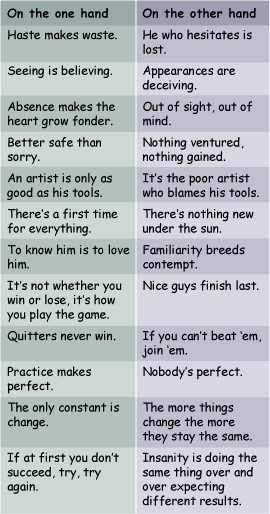
They say there’s a right way and a wrong way to do things, yet there’s more than one way to skin a cat. Which pithy bit of folksy wisdom do we go with? I guess all we can do when we find ourselves on the horns of a dilemma is follow the advice of Yogi Berra, “When you come to a fork in the road, take it.”
Filed 12/10/10
Infrequently Answered Questions
You Won’t go Blind from TV
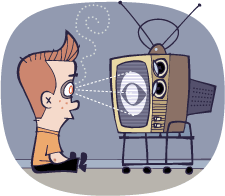
Q: Is TV bad for your eyes as my mother used to tell me?
A: Staring into bright lights can hurt your eyes, sure, but how bright is the light from a TV? Set your TV in front of a big window on a sunny day and compare. Not convinced? Turn off all the lights and see how much the TV lights up the room. Anyway, your eyes are pretty safe from TV, the danger is to your brain. But that’s from content not radiation.
As for what our moms say, I suspect they told us TV hurts our eyes just to get us out of the house. I mean, when my mom said it she didn’t add, “Go read a book.” She’d say, “Go outside and play.”
Filed 12/7/10
Infrequently Answered Questions
Weasel Words
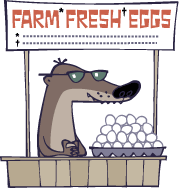
Q: People talk of weaseling out of a promise and weasel words. What do weasels have to do with it?
A: Weaseling and weasel words are all about empty promises. In a contract or ad it’s the small print that gets you off the hook. Now the question is why blame this sort of deception on a weasel. It stems from the idea of weasels eating eggs where they poke a tiny hole and suck out the good bits leaving the shell intact. So the egg looks like a full egg even though it’s empty.
So, with weasel words you get a promise that seems like a promise only it’s an empty promise.
Filed 11/8/10
Packrats Might Come in Handy Someday

“Don’t throw that out, it might come in handy some day.” Sound like anyone you know? Maybe you? Taken to the extreme this is the philosophy of the packrat.
Take the true case of Mr. S who saved everything because “Well, you never know.” His house was all rooms with no room, just pathways between piles of stuff. Toys, broken televisions, non-working radios, newspapers, lumber, empty cottage cheese containers… anything and everything whether valuable or not. Mostly not. He never traded in cars, just stored the worn out models on the property. Though if you peered into his garage you’d never know there were cars inside under all the other junk. Mr. S was the quintessential packrat.
Why do they do it, you might wonder. My guess is anti-wastefulness, the notion it’s a shame to discard what is still good. Or at least not yet utterly rotted to the core. So instead of sending it to a landfill they keep their own private indoor landfill in the hope that sometime-or-other, somehow-or-other to someone-or-other “it might come in handy.”
Even if not themselves, “somebody could use this” they imagine. What’s lacking is a distribution system. Enter the garage sale. Or if they hope to fool people into thinking their junk is valuable they call it an estate sale. Though your hardcore packrat only submits to a garage sale at the cajolery of relatives.
You might wonder, what’s the difference between a packrat and a collector.
Firstly, collecting is an activity, the collector goes out and gets. Packrattery is a lack of activity, packrats just let thing pile up. Second is selectivity, collectors collect specific things, packrats just accumulate everything. Next is worth, collectors usually have an eye on value, packrats merely consider if it “might come in handy some day.” Lastly, collectors usually organize, display and keep their collections clean, packrats not so much.
Which brings up a few last questions. Do you have a guest bedroom no guest ever uses but is basically a storehouse for all your junk? If so, is it really a guest bedroom or a big closet? Can you not get the car into the garage because of all the gear in there? Do you have a storage unit which mainly contains stuff you don’t really need or use? If so, you just might be a packrat.
Filed 10/26/10
Votes Are Like… Everyone Gets One

“Democracy is just a fancy word for pooling a country’s ignorance and unleashing it wholesale on its citizens.”
—Norton I, Emperor of the United States (AKA Joshua Abraham Norton)
How much stock we should put in the ideas of a “lovable old humbug,” as Mark Twain called him, is hard to say. Still, the sentiments are not all that different from those of famous curmudgeon, or joyous libertarian if you’d rather, H.L. Mencken.
“Democracy is a pathetic belief in the collective wisdom of individual ignorance. No one in this world has ever lost money by underestimating the intelligence of the great masses of the plain people. Nor has anyone ever lost public office thereby.”
Though writing almost a century ago his observations of political claptrap and folly are just as pertinent, and impertinent today.
Filed 10/16/10
Infrequently Answered Questions
You Weigh the Same as the Earth Weighs

Q: How much does the Earth weigh?
A: Believe it or not, the Earth weighs a mere 190 pounds. To me anyway. That’s because I weigh 190 pounds. You see, weight is relative to the gravity of where you do the weighing. On the moon I’d weigh much less, on Jupiter I’d weigh considerably more. My mass is the same at all times, only my weight changes.
Common calculations of the Earth’s weight are as if you took chunks of the planet and weighed them on a scale on the Earth’s surface, then added it all up. (Or if you weighed the Earth on a twin Earth. Though you’ll have a hard time finding such a planet, putting the Earth on it, and having a scale that wouldn’t be utterly crushed in the process.) If you did the weighing on the surface of the moon, the Earth would weigh a lot less. If you did it on the surface of Jupiter, it’d weigh a lot more.
On a bathroom scale on the Earth I weigh 190 pounds. So then, if the Earth were on me it would weigh 190 pounds. Here’s how you prove it: turn the bathroom scale upside down. Then the Earth is on the scale and the scale is on me. In which case the Earth weighs 190 pounds.
If you think about it, gravity is a pitifully feeble force. Here we have a humongous mass, which we call planet Earth, and all it can muster by way of gravity on you is a couple hundred pounds. Now, think of that the other way around. How much gravity in your puny body can you apply to the whole of the Earth? Well, a couple hundred pounds is all.
Filed 10/13/10
Not-so-great Greats
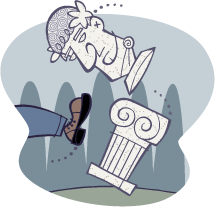
Not Necessarily the Top, But Ten Overrated People
- William Shakespeare
- Marco Polo
- Albert Einstein
- Alexander the Great
- Pablo Picasso
- Alan Greenspan
- Lorenzo the Magnificent
- Jackie Gleason
- Spider-man
- Mother Nature
1. Preposterous plot elements, stilted dialog, and comedies that are not to be laughed at. Though if Francis Bacon wrote the plays it wasn’t Shakespeare’s fault. Then again, if Shakespeare didn’t write them he’s even more overrated.
2. A total fraud. There’s no record of Marco Polo in any Chinese archives. There’s no record of the Great Wall of China in Polo’s writings. How could he have missed it?
3. Did some nice math, but bend space? That’s like saying you can cut a hole in a vacuum. Get real.
4. He killed how many for what purpose? His empire lasted how long and produced what benefit? I’m picking on Alexander, but anyone called “The Great” usually includes a high body count.
5. The artist as creator of collectibles, valuable because they’re valuable. My niece could paint better, and I don’t even have a niece.
6. The Maestro? Two massive bubbles and two massive crashes. Very masterful indeed.
7. I don’t know a thing about him, but I suspect calling anyone “The Magnificent” might be overdoing it a tad.
8. Only included because he was called “The Great One.” What did he ever do? A sit-com, a variety show, a vaudville act. What am I missing?
9. Spidey powers? C’mon. Superman had superpowers. Superman could put on a pair of glasses and nobody would recognize him. Now that’s a superpower.
10. Freezing in winter, hot as blazes in summer, tornadoes, earthquakes, hurricanes, volcanoes. Some mother!
Filed 9/21/10
Infrequently Answered Questions
Mythical Origins of Urban Legends

Q: Where do urban legends come from?
A: As the name implies, they come from the urbs. These are found just above the suburbs and below the overurbs. Though the point of origin isn’t in the heart of the urbs, but in the urban fringe. Urban legends grow and spread best where the population and the people are densest.
These legends are just rumors that have gotten out of hand and taken on a life of their own. Scientists are at a loss as to how this happens exactly and there’s a great deal of debate about when this life begins. Some say at the moment of conception, others when it reaches the third person.
Anyway, this is how it more-or-less works. (Artist’s misconception)
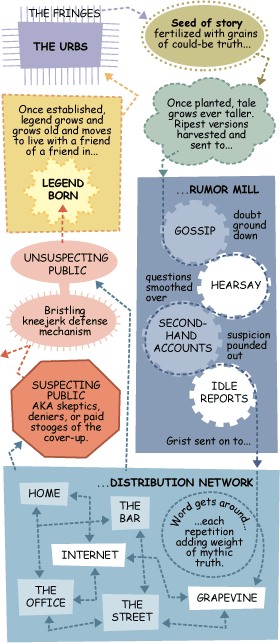
Whatever the case, like rumors and juicy gossip, urban legends are very hard to kill as most are just too good to be untrue. And much too much fun not to repeat. Not even the real facts will stop an urban legend in its tracks. That they would is an urban legend. The only way to bring them to bay is to kill the messenger, but in most civilized (urbanized) places this is frowned upon.
Filed 9/8/10
The Casual Sportsman
World Cup Afterthought
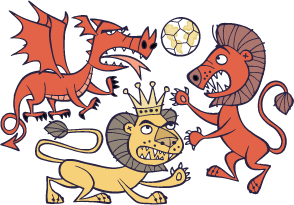
Why are there so many national teams from the UK in FIFA? There’s an England team and a Scotland team. And we think a Wales team and a Northern Ireland team, too. On the other hand, there’s no Bavaria team, Prussia team, and a Hessian team, there’s only one team for the whole of Germany. What’s so special about the UK it has more than one?
After all, doesn’t UK mean United Kingdom? If they’re so united why the separate teams? No other country splits its soccer effort up that way. Why? How did this happen? What does the rest of the world think about the UK having multiple teams when everyone else only gets one each?
It’s not like the UK was only recently united. Not that long ago Germany had two teams, East and West, but since reunification now have one. Korea has two, but then there are two Koreas. What gives? Is the UK a single country or an empire of several countries? They only have one queen, right? Heck, the Prince of Wales will become the King of England some day.
Makes you wonder. Well, even if it doesn’t make you wonder, it makes me wonder.
Filed 8/24/10
Infrequently Answered Questions
Why Rain Drops in Drops
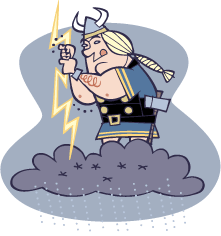
Q: Why doesn’t water fall from clouds as mist? I mean, how can raindrops grow so large before falling when water is so much heavier than air? What’s holding them up until then?
A: This is one of the great unsolved mysteries of nature. Not that nature hasn’t solved it, after all it happens. Fact is, clouds and rain are well-known, but not well understood. At least not by me. Be that as it may, let me postulate my own hypothetical conjecture. Meaning make something up.
Raindrops don’t float, they drop, which is why they’re called raindrops. Before they drop they’re rainfloats. These float because they’re made of H2O, two bits of hydrogen, which are lighter than air, and one bit of oxygen, which is air. So of course it would float. The real mystery is why it ever drops.
At this point you might be thinking this is a load of nonsense. Well, you’re right. Thor had red hair and a beard and Vikings didn’t sport helmets festooned with horns.
Filed 8/4/10
Dirty Pigs Are Cool
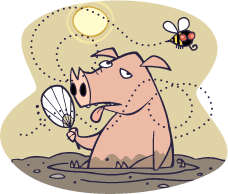
Do these old expressions make sense?
Make a beeline.
Sweat like a pig.
Lie like a dog
A beeline is supposed to be straight and fast. Have you ever watched bees? They don’t go all that straight and fast as far as I’ve observed. More like a zig-zag meander. Though if you them upset them and they swarm maybe it’s a different story. In which case you make a beeline out of there lickety-split.
Next, pigs don’t sweat. Or so they say. That’s why they wallow in the mud, to cool off. To be honest, I don’t know what animals sweat like people. Dogs pant and horses lather. Is that sweat? I dunno. I also don’t know the difference between a pig a hog and a boar. Though I guess none of them sweat.
In my experience, outside of tall tales and jokes dogs don’t talk. So how could they lie? Besides, dogs don’t have a reputation for dishonesty. A dog is man’s best friend, right? That’s why we name some Fido, from the Latin fidelis, faithful.
Filed 7/8/10
Loose Lips Sink Slips

Folks who speak a good deal in public are bound to make the occasional gaff. Politicians are no exception to the outspoken sometimes tying their tongues and logic in knots. Still, you have to wonder about the thinking behind the following statements:
“Things are more like they are now than they have ever been.”
—Gerald Ford
“The streets are safe in Philadelphia — it’s only the people who make them unsafe.”
—Frank Rizzo, mayor of Philadelphia.
“There are two kinds of truth. There are real truths, and there are made up truths.”
—Marion Barry, mayor of Washington
“A zebra does not change its spots.”
—Al Gore
“We’ve got to act wisely and otherwisely.”
—Allan Lampart, mayor of Toronto
“I stand by my misstatements.”
—Dan Quayle
Filed 6/3/10
Infrequently Answered Questions
The Four Elemental States
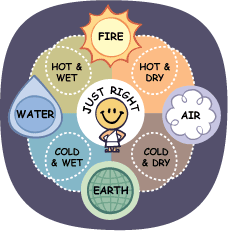
Q: What’s with the medieval belief in four elements? How could they think fire was an element?
A: There is a tendency amongst some to be a bit smug toward past thoughts and ideas. You know, we’re modern and scientific and the silly ancients believed so much superstition, they just didn’t understand like we clever folks do today. But what if the misunderstanding is on our part? We don’t understand what they understood because ideas and meanings were lost in transmission and translation over time.
Let’s examine the old idea of the four elements, the cosmos consisting of earth, water, air and fire. How silly, we think. Was it? Instead of the word ‘element’ what if we substitute the phrase ‘state of matter’ in its place. Now the ancient’s thinking aligns with current thinking of four states of matter: solid, liquid, gas, and plasma.
Now then, let’s replace the four old elements with a corresponding state of matter. Earth is solid, water is liquid, air is gas, fire is plasma. In this case the ancient concepts are the same as the modern concept. And they beat us to the punch by 2,500 years without any modern instruments.
Who looks like the clever ones now?
The ancients had the insight that fire and lightning represented an essentially different regime of matter than ordinary air. Furthermore, the great electrical pioneer Michael Faraday was aware the ancients were aware. As he said, “It was what the ancients believed, and it may be what a future race will realise.”
Filed 6/1/10
The People’s Choice

demagogue (dəm′ ə-gŏg) noun. 1. A leader who obtains power by means of impassioned appeals to the emotions and prejudices of the populace. 2. A leader of the people in ancient times. [Greek demos, common people + agogos, leading.]
This word, like the type of politician it defines, goes way back. In fact, Aristophanes (446-386 B.C.) defined demagogue thusly: A political leader who seeks support by appealing to popular desires and prejudices rather than by using rational argument.
Of course, one man’s demagoue is another’s leg-tingling inspirational speaker, and one man’s prejudice is another’s “We hold these truths to be self-evident.” But for my money the best definition comes from my favorite acid-tongued curmudgeon, H.L. Mencken, who wrote a demogogue is…
“…one who preaches doctrines he knows to be untrue to men he knows to be idiots.“
Filed 5/25/10
Did the Ancient Egyptians Eat Potato Cheops?
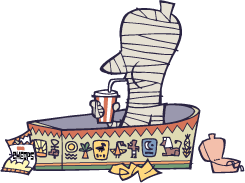
Though many people now-a-days like to blame heart disease on our all-so-modern lifestyle and diet, it seems hardening of the arteries and whatnot are as old as the hills. Or as old as the pyramids. As reported in The Wall Street Journal:
[Researchers] were able to identify the hearts, arteries or both in 16 of the mummies, nine of whom had deposits of calcification… “Not only do we have atherosclerosis [artery hardening] now, it was prevalent as long as 3,500 years ago,” said Gregory Thomas, a cardiologist and imaging specialist at University of California, Irvine, who was principal investigator of the study. “It is part of the human condition.”
Where the ancient Egyptians weren’t eating junk food? They ate all organic produce, right? Or did they guzzle lavish doses of Ramses Cola and gobble Tater Tuts?
Filed 5/20/10
Recycling Oscar Wilde

“The only way to rid yourself of temptation is to yield to it.”
—Oscar Wilde
An epigram, a paradox, irony? Whatever it is, it’s the kind of thing Wilde was wild for. He used them quite a bit. As in “I love talking about nothing, father. It’s the only thing I know anything about.”
Many wits like to play at this game, half-wits, too. Being one or the other I’ll give it a go with the following. I’ll start with my own line, or epigram, or whatever. That’s followed by a snippet from Wilde’s The Importance of Being Earnest which forms a sort-of reply.
Imitation is the sincerest form of plagiarism.
Jack: Is that clever?
Algernon: It is perfectly phrased! and quite as true as any observation in civilized life should be.
Jack: I am sick to death of cleverness. Everybody is clever now-a-days. You can’t go anywhere without meeting clever people. The thing has become an absolute public nuisance. I wish to goodness we had a few fools left.
Algernon: We have.
Jack: I should extremely like to meet them. What do they talk about?
Algernon: The fools? Oh! about the clever people, of course.
Jack: What fools!
Filed 5/14/10
Son of the Return of the Department of Redundancy and Repetition Department Redux II
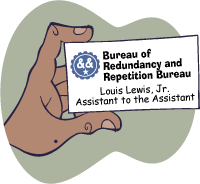
Here is another short list of a few more repetitious redundancies yet again:
- End result
- Prior history
- Exact replica
- Viewing audience
- Free giveaway
- Added extra
- Added bonus
- Extra bonus
- Dead and gone
- Over and done
Then there’s this run-on phrase that’s in the same vein, “at this point in time.” Maybe I’m nitpicking, but you really don’t need the “in time” tacked on the end. If you just say “at this point” the point in question is a time point, isn’t it? Still, the whole phrase is more or less a longwinded way to say “now” or “yet” anyway. And with that, this entry is now truly over and done.
Filed 5/3/10
Infrequently Answered Questions
Short Shrift
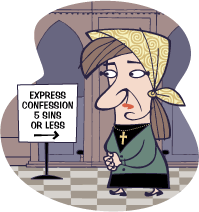
Q: I’ve heard of giving short shrift, is there long shrift? What is shrift anyway?
A: Shrift is the act of confession. Also called shriving, though not by many people that I’ve ever heard. Then again I’m not Catholic, maybe it’s used in those circles.
Now then, if a father confessor is lax, inattentive, or generally lazy and not performing his full duty of hearing confessions, that’s giving short shrift. If the confessor tells the parishioner, “Can you wrap it up? I’ve got a tee time in an hour.” that’s giving short shrift. If a parishioner hears “Leave your confession at the sound of the beep.” that’s giving short shrift.
Filed 4/7/10
Infrequently Answered Questions
Some Modern “Art” Literally Is Crap
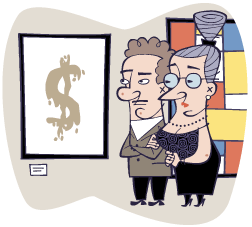
Q: I just returned from the Tate. How is feces in a can art?
A: We’ll let Andy Warhol field that one:
“Art is what you can get away with.”
We’ll let Robert Rauschenberg expand a bit on the hidden depths of modern art:
“What you see is what you see.”
Now you know what that can of feces was: crap. And finally, we let Salvador Dali expound on the inner workings of modern artistic genius:
“My motivation is pure. I do it for the money.”
Filed 3/23/10
Look at All the Stuff You Weren’t Looking For

What’s with the computers in TV crime labs? Do they really need to display every fingerprint or face it’s trying to match in its database? Why would the monitor show and reject each non-matching one with a black bar reading “No Match” and make a little bink sound? Wouldn’t that drive the lab workers crazy?
I mean, when you do a search function on your computer does it display what does not match? What would be the point? Can the computer only “see” if something matches by “looking” at it on the monitor? All a computer really understands is zeros and ones, the screen display is for the user. Are these crime lab folks staring at their computer as it goes through hundreds of fingerprints looking for a match which the computer stops at automatically anyway?
This reminds me of moviedom computers in the old days which “beepity-booped” and had banks of blinking lights. Which were for what, exactly? They randomly blinked but didn’t display any information at all. About all they did was show the computer was working, and at what speed. How is that helpful?
Actually, I can tell you how it’s helpful. It’s eye candy for the viewing audience. It’s TV, after all.
Filed 3/17/10
Food to Squirrels, Junk to Us
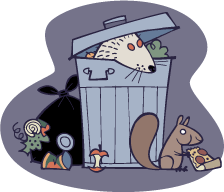
What do squirrels eat when they can’t find acorns? Pizza. At least I saw a squirrel on top of the garage eating a slice of cold pizza the other day. They also eat corn. Well, they ate all the corn I tried to grow in the back garden. They like eating out of bird feeders, too. So they must eat what birds eat.
I don’t know what the birds, mice, possums, and other suburban wildlife eat, but they get by as there’s plenty of critters hereabouts. Still, when I look out at the yard I don’t see much of anything I’d call food. But then, I’m not a squirrel and don’t eat raw acorns, which I think are poisonous to people. Which might explain why there’s no acorn granola. Maybe.
Of course, some wildlife eats our leftovers which we conveniently supply in easy-open plastic bags or garbage cans. Just the other night I surprised a possum having a snack in the garbage can. Or maybe it just surprised me. Hard to tell what a sluggish possum is feeling as they don’t react much one way or another. This one just sat there, playing possum. Though being an actual possum it wasn’t playing at it.
While I don’t recall ever seeing it firsthand, I suppose squirrels eat our trash, too. How else to explain the cold pizza.
Filed 3/7/10
Bloody Barber Poles!
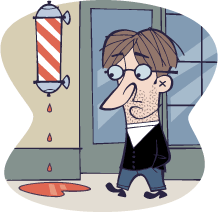
Old time symbolic signs made it possible for illiterates to know where to shop. For instance, the three balls on a pawn shop told the great unwashed where to get a loan. Still, how does a red and white striped pole mean “get your hair cut here”?
Back in the day, way back, a barber was the go-to guy to have your hair cut off, your beard cut off, or your pinky toe cut off. Ye olde barbers treated wounds and performed simple surgery. The red and white stripes of a barber pole represent blood and bandaging, or a bloody bandage. You might say early barbers were prot10-09urgeons.
Before the 19th century surgeons weren’t doctors and vice-versa. In simple terms, doctors treated diseases while surgeons treated injuries. Doctors employed potions and bleeding and whatnot to restore a patient’s balance of humors which they thought was unique to each patient. Surgeons were more tradesman-like with a hands-on understanding of flesh and bone which they treated with tools. Surgeons thought a wound was a wound whoever was wounded.
The stock of surgeons rose during wartime where treating wounds was just what the doctor ordered, even though surgeons did it. Wounded soldiers needed surgeons using tools rather than doctors using elixirs and bleeding. Especially since the wounded were already bleeding.
Fast-forward to today and surgeons are doctors, and barbers no longer cut off anything but hair. If the symbolic red and white pole had gone over to doctoring with the surgeons perhaps hospitals would be adorned with barber poles instead of snakes on a winged staff. Where that symbol comes from is another story for another day. As is why a pawn shop sports a trio of balls.
Filed 2/2/10
Turn Vice into Virtue
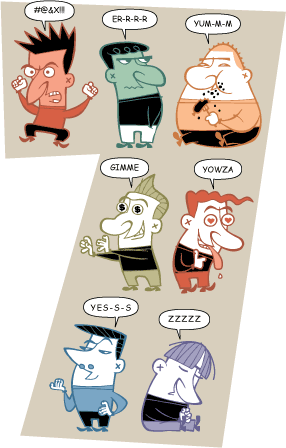
The proverbial seven deadly sins are anger, envy, gluttony, greed, lust, pride, and sloth. People are mostly against these sins. At least in other people. However, if we replace the words with less odious terms to apply to ourselves we can transform from sinners into saints. Or if not saints exactly, sinners lite.
Instead of anger, say outrage.
Instead of envy, say equality.
Instead of gluttony, say gourmandery.
Instead of greed, say self-interest.
Instead of lust, say hot-blooded.
Instead of pride, say self-esteem.
Instead of sloth, say laid-back.
Now then, don’t you feel better about yourself? But don’t get carried away with the feeling or you’re back to pride.
On the other hand there are folks who make a virtue of “acting naturally.” These people will tell you checking your natural inclination in favor of some societal rule of behavior is fake, hypocritical or dishonest. (Is there a Dr. House in the house?)
But ask yourself, how many of the seven deadly sins are natural impulses. If your answer is seven, then the seven sins: anger, envy, gluttony, greed, lust, pride, and sloth; become seven virtues: act naturally, act naturally, act naturally, act naturally, act naturally, act naturally, and act naturally.
An important point of civilization is to get people to act civilized and stop acting naturally. At least where our natural impulses are harmful. To behave according to social convention is not hypocritical if you believe it’s the right thing to do. You might say it’s the victory of the civilized mind over the natural brain, the triumph of reason over impulse.
Filed 1/21/10
Eating Rocks is Good For You
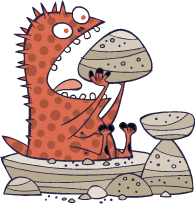
They tell me salt is the only rock we eat. At least the only rock we eat on purpose with a purpose. And the only one that tastes good. Other rocks in our food is grit, which is almost always unpleasant.
But then we eat little bits of many unsavory things besides grit that get in food. Like animal hair, insect parts, worm castings and so on. Kept to a minimum we can survive all that. Of course finding an entire rat in your food is an unwelcome prospect. Finding one in your KFC is possibly a lawsuit or an urban myth.
On the other hand salt is required eating as we need it for a biological process we call “being alive.” They also tell me this is because land animals evolved from sea creatures that migrated out of the oceans. To survive out of water, land animals had to take the sea with them. So we are in large part water, or rather salt water if you will.
All of which reminds me of what might be the first joke I ever heard. A riddle actually. What’s big and red and eats rocks? A big red rock eater. Yes, it’s a silly joke, but it didn’t take much to amuse me at five years of age. Still, though I am not five years old, big and red, I do eat rocks. So do you.
Filed 1/14/10